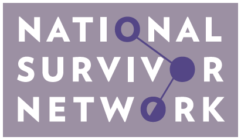February 16, 2022 | Category: Values Orientation
The National Survivor Network is a values-based membership and professional network for survivors of human trafficking engaged in or preparing for leadership in the anti-trafficking movement. Our aim is to develop, equip, and empower a community of survivors of human trafficking engaging in advocacy, education, peer-to-peer mentorship, prevention, and policy work using a public health framework and human rights approach. In order to do so in a way that is effective, in line with our values, and that lessens the likelihood of survivors experiencing harm, our values statement outlines the kinds of communication we embrace, the type of space we hope to hold, and the kind of survivor leadership we want to empower.
Our second value states: “The NSN believes in trauma-informed, nonviolent communication, and building survivor-centric cultures of care. We emphasize collective goals, shared facilitation, and active listening, and promote informed, inclusive, and equitable dialogue over debate. We seek to create a space where people acknowledge and strategically leverage their privilege and positionality to increase access for all survivors, where resources are shared, where content and strategies are healing and growth-centered, and where we all have the shared responsibility of keeping the space as harm-free as possible through community accountability, including for lateral violence. We embrace generative conflict over comfort within the bounds of our shared values, which are articulated in our Values Statement.”
That’s a lot of words that have specific meanings! What does that even mean?!
Well, first of all, we are primarily a membership and professional network for survivors of human trafficking. This means that there is a 100% chance that every person we support through this work or meet on NSN projects or at NSN meetings is a survivor of trauma. There’s even a very high chance that many of us are survivors of complex trauma, or that we have other mental health or cognitive diagnoses that make it likely that we’ll occasionally misspeak, get overwhelmed, or have our trauma triggered in our work. For this reason, it’s important to us that the way we speak to each other shows a respect for how our interactions impact our own and each other’s trauma responses. And while we know that nonviolent communication is a specific practice with explicit norms, when we say nonviolent communication, we are referring to compassionate communication that seeks to understand, to clarify, to articulate needs, and to navigate generative conflict with integrity and reducing harm.
Which might leave you wondering – what is generative conflict? “Generative conflict holds repair and growth as its goals and ideals; is between people who are collaborating toward greater understanding and equity, and who listen to and hear each other; and is solution-oriented. This is in comparison to counter-productive conflict, which has being right or proving the other wrong as its goals and ideals; loses sight of collaboration; causes participants, particularly those with marginalized identities, to feel unheard or unseen; and is not solution-oriented.” (Emergent Space)
We know that conflict and disagreement are unavoidable, and that they are necessary to growth and challenging privilege. We know that a need to preserve comfort, especially for those with more power in our society, communities, or movement runs counter to ending oppression. And also, we know that unless the conflict is managed with a focus on generating growth and healing, it runs the risk of causing needless harm, or even becoming abuse. We expect all members to agree to our Expectations for How We Show Up (formerly “Code of Conduct”), and prioritize approaches to accountability for harm caused that are community-based, healing-centered, and that do not replicate carceral patterns.
In our movement, we talk a lot about power dynamics between providers and survivors but only rarely do we directly address power dynamics between survivors engaged in movement leadership. These power dynamics may manifest in 1) gatekeeping survivors’ access to movement spaces when they don’t repeat the mainstream narratives, 2) competition for resources rather than movement-building, or 3) outright bullying, slander, and harassment of survivors by other survivor leaders. When we do not address these power dynamics directly, our valuable time and energy is spent defensively sidestepping and trying to work around those dynamics. This reduces the impact and scope of survivor leadership in the movement by keeping survivors in their trauma rather than building them up as leaders and experts who are capable of holding (and learning to hold) uncomfortable conversations.
The NSN hopes to have our membership learn to leverage their privilege and positionality to address power imbalances and to ensure that survivors who have typically been marginalized in our society, our movement, and our network have access to full participation in movement leadership. When we outline clear expectations for how we communicate and hold space and provide options for accountability when we misstep, our members’ energy is freed to focus on addressing how to end human trafficking. In this way, the NSN hopes to foster meaningful survivor leadership in the movement rather than tokenized contributions, the mitigation of power dynamics over when and how survivors choose to tell their stories, and a movement whose frameworks are big enough to accommodate and advocate for those survivors whose narratives have been ignored or invalidated.
…
Read the third in our values orientation series, “Human Rights and Public Health” and view our full values statement here.
